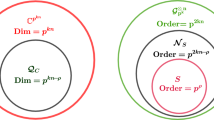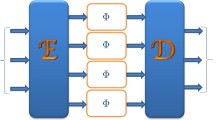Abstract
The size of vertex set of quantum trellises affects the efficiency of decoding algorithms, which can be improved by reducing the number of vertices. Based on the standard check matrix of stabilizer codes, an algorithm to construct trellis-oriented generators for quantum stabilizer codes is presented. By using this algorithm, the trellises with minimal vertex set can be constructed. In addition, an algorithm to construct trellises iteratively for quantum stabilizer codes is also introduced. The algorithm proposed in this paper is more efficient and less complex than the one proposed by Olliver, and so is more suitable for the applications of larger scale and stricter timeliness.
Similar content being viewed by others
References
Nielsen M A, Chuang I L. Quantum Computation and Quantum Information. Cambridge: Cambridge University Press, 2000. 72–145
Poulin D, Tillich J P. Quantum serial turbo codes. IEEE Trans Inform Theory, 2009, 55: 2776–1798
Ollivier H, Tillich J P. Trellises for stabilizer codes: definition and uses. Phys Rev A, 2006, 74: 032304
Calderbank A R, Rains E M, Shor P W, et al. Quantum error correction via codes over GF(4). IEEE Trans Inform Theory, 1998, 44: 1369–1387
Ketkar A, Klappenecker A, Kumar S, et al. Nonbinary stabilizer codes over finite fields. IEEE Trans Inform Theory, 2006, 52: 4892–4914
Zhong S Q, Ma Z, Xu Y J. Constructing quantum error correcting code via logic function. Sci China Inf Sci, 2010, 53: 515–523
Aggarwal V, Calderbank A R. Boolean function, projection operators, and quantum error correcting codes. IEEE Trans Inform Theory, 2008, 54: 1700–1707
Cross A, Smith G, Wehner S, et al. Codeword stabilized quantum codes. IEEE Trans Inform Theory, 2009, 55: 433–438
Rahn B, Doherty A C, Mabuchi H. Exact performance of concatenated quantum codes. Phys Rev A, 2002, 66: 032304
Hsieh M H, Gall F L. NP-hardness of decoding quantum error correction codes. arXiv: quant-ph/10091319
Shao J H, Bai B M, Lin W, et al. Jointly-check iterative decoding algorithm for quantum sparse graph codes. Chin Phys B, 2010, 19: 080307
Gottesman D. Stabilizer codes and quantum error correction. Pasadena: California Institute of Technology, 1997. 17–36
Gottesman D. Class of quantum error-correcting codes saturating the quantum Hamming bound. Phys Rev A, 1996, 54: 1862–1868
Ho K H, Chau H F. Purifying Greenberger-Horne-Zeilinger states using degenerate quantum codes. Phys Rev A, 2008, 78: 042329
Sarvepalli P, Klappenecker A. Degenerate quantum codes and the quantum Hamming bound. Phys Rev A, 2010, 81: 032318
Xiao F Y, Chen H W. Error correction and decoding for quantum stabilizer codes (in Chinese). Acta Phys Sin, 2011, 60: 080303
Author information
Authors and Affiliations
Corresponding author
Rights and permissions
About this article
Cite this article
Xiao, F., Chen, H. Construction of minimal trellises for quantum stabilizer codes. Sci. China Inf. Sci. 56, 1–11 (2013). https://doi.org/10.1007/s11432-012-4595-6
Received:
Accepted:
Published:
Issue Date:
DOI: https://doi.org/10.1007/s11432-012-4595-6




